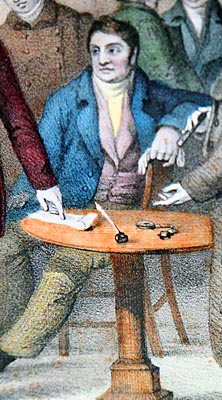 |
 |
|||
|
|
Anthony Bacon was the eldest of the five illegitimate children of Anthony Bacon of Cyfarthfa in Glamoganshire and Woodford in Essex, by his mistress, a Gloucester girl named Mary Bushby. His father paid for his schooling by a Rev. Stocke of Gloucester, which he undertook using the name of 'William Addison'. He also used the names Anthony Smith and Anthony Frankland, but was generally called Anthony Bushby. Anthony Bacon Senior was one of the richest men in the country who had built the Cyfarthfa forge and furnace which had established Merthyr Tydfil as a major centre of ironworking. As his only legitimate son had predeceased him, at his death, Anthony Senior divided his fortune amongst Anthony Bushby and his three brothers and single sister who then took the name Bacon. In the end, only Anthony and his brother Thomas lived to fully enjoy their inheritance, which was kept in trust by their half-uncle, William Bacon. Anthony inherited the Cyfarthfa Ironworks and Thomas the nearby Plymouth Ironworks. However, neither of them were interested in running a great industrial empire. Upon coming of age in 1793, Anthony rented Cyfartha to his father's former cannon-maufacturing partner, Richard Crawshay (the grandfather of William Crawshay II of Cyfartha Castle & Caversham Park). Similarly, when Thomas was twenty-one, he agreed to sell the Plymouth Works to his maternal uncle, Richard Hill. The sale was finalized in 1804 but, two years later, Thomas purchased Anthony's share of the Hirwaun works instead. He too sold up eventually. With the proceeds, Anthony purchased the Aberaman estate, in the Rhondda Valley, from the Mathews family. However, the brothers also decided to find themselves country estates in the Thames Valley, nearer London society. By 1797, Anthony was apparently renting Donnington Grove from William Brummell, although he is also said to have lived at Donnington Castle House where his brother was resident from about 1830. A few years later, Anthony was living in Newtown, just over the Hampshire boundary from Newbury and, in 1811, he rented the magnificent Benham Park, a house that reflected his standing. It was in that year that he served as one of the stewards who oversaw fair play at the making of the celebrated Newbury Coat. Anthony was a great horseman. He enjoyed hunting and was joint master of the Craven Hunt in 1813 & 14. He also served nearly twenty years as the commander of the Donnington Castle and Newbury troop of the 1st Berkshire Cavalry and, being very popular, was presented, for his patriotic service, with a handsome piece of plate upon his retirement in 1823. Two years previously, he had decided to purchase the Elcot estate in Kintbury and so moved out of Benham. Here he took a great interest in his conservatory and, having first experimented at his Welsh home, immediately installed a hot water heating mechanism for it, some seven years before this system became widely used elsewhere. He died at Aberaman House on 11th August 1827, but his body was removed to the family vault in the church of Shaw-cum Donnington, where a rather unimpressive mural tablet to his memory may be seen. Anthony had married Elizabeth, the daughter and sole heiress of Richard Ramsbottom MP of Clewer Cottage at Clewer & Woodside House at Old Windsor in Berkshire. They had eleven children together, including the Napoleonic General Anthony Bacon who became a colonial promoter in Australia; Colonel Charles Bacon of the Royal Berkshire Militia; Elizabeth wife of Thomas Thornhill and ancestress of the Morland Brewers of Abingdon; and Emily wife of the Father of the House of Commons, Thomas Peers Williams of Temple House in Bisham. The Bacon Arms in Newbury is named after the family.
|
|||
| © Nash Ford Publishing 2011. All Rights Reserved. | ||||



 Anthony Bushby Bacon (1772-1827)
Anthony Bushby Bacon (1772-1827)